|
OMG PIVC Study News The OMG PIVC study is officially the largest prevalence study ever undertaken of peripheral IV catheters.
With data now entered from 410 hospitals in 50 countries and 15 languages, the results and benchmarking
opportunities promise to be fascinating. Thanks to everyone who has contributed to making this study a
huge success.
We are approaching the data analysis phase, and we expect the results to be published
in the first half of 2016. You can follow the study progress on our website www.omgpivc.org
OMG Study wins Award
International study on catheters wins Research Impact
Competition
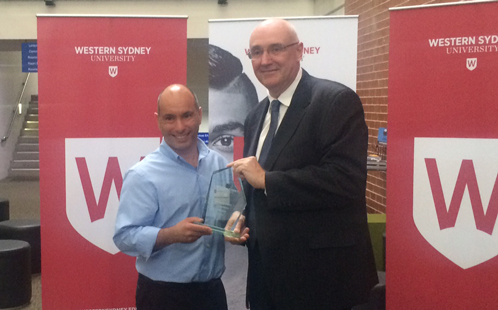
Research Impact Competition Winner Evan Alexandrou with Vice-Chancellor
Barney Glover
A medical researcher working on a landmark international study into the
problems caused by catheters has won Western Sydney University's Research Impact Competition.
The
Research Impact Competition gathered 13 of Western's promising academics to present their research findings
to the public in under five minutes.
Evan Alexandrou from the School of Nursing and Midwifery was
awarded first place and $5,000 towards his future research after impressing the judges with his presentation
"One Million Global Catheters Worldwide Prevalence Study".
Dr Alexandrou's research into the impact
of peripheral intravenous catheters (PIVC) is the first of its kind, and will provide a snapshot of the
prevalence of catheter use and complications, such as patient discomfort and delays in vital treatment.
Most research related to PIVCs is conducted and reported in economically developed nations, with the
use and management of PIVCs in developing nations largely unknown.
For the full article click
here.
USA Meetings
3M
Global I.V. Leadership Summit
Leaders Teaching Leaders: Translating Evidence
into Practice
(by Amanda Ullman)
Nancy Moureau and I were fortunate enough to represent
the AVATAR group at the recent 3M Global I.V. Leadership Summit held in Minneapolis Minnesota in September
2015. Such an inspiring and collaborative summit! This annual education event brought together clinician
leaders in vascular access and infection prevention from around the world. Attending were over 140 clinicians
from the US, Latin America, Asia and Western Europe. Slides and highlights can still be found on twitter
following #3MIV.
This year's theme was Leaders Teaching Leaders: Translating Evidence into
Practice. The presentations from Beth Gore (BA, MA, PhD (cand)) about the other side of the line (patient
and caregiver perspectives) and Mark Rupp (MD): reducing catheter-related bloodstream infection, improving
outcomes stimulated a large amount of discussion and practice indicatives'.
Nancy described
her ongoing work to improve practice for the insertion and management of central venous access devices
and peripherally inserted central catheters. I spoke about the Science of PIVs: Optimal Placement and
Extended Use. Both inspired lively debate and plenty of ideas for future research priorities.

Picture: Meeting of the skin impairment working group at 3M Global I.V. Leadership Summit
Association for Vascular Access: Annual
Scientific Meeting
AVATAR was well represented at the recent Association for
Vascular Access Annual Scientific Meeting in Dallas, Texas. Held at the Gaylord Hotel this truly
awe inspiring venue proved that everything really is bigger in Texas.
The invited, abstract
and poster presentations by the AVATAR group were extremely impressive. The peripheral IV routine replacement
debate, OMG results, flushing, peripheral, arterial and central venous access device securement presentations
were all made to a packed house. The ongoing interest by clinicians and industry regarding the AVATAR
research outcomes is huge! Congratulations to all the people who have contributed to the research that
was presented at this conference!
Congratulations and thanks to the amazing work by the
AVA conference organising committee so many fabulous presentations from clinicians, academics and industry
from across the world. We also wish to thank 3M, BD and Centurion for providing financial assistance to
support our AVATAR attendees travel costs.

Picture: The AVATAR leadership enjoying the Dallas hospitality

Picture: a packed house for the OMG presentation
New AVATAR Chapter- Western Australia Pete Carr: @pcarriv
Lecturer Emergency Medicine at The University of Western Australia and PhD
(C) at Griffith University is the inaugural Western Australia chapter lead of AVATAR.
Pete
Carr (AVATAR WA Lead) and Gavin Jackson (WA AVATAR CNC and State Representative WA-AVAS ) are panel members
for a WA state-wide PIVC clinical practice guideline.
Pete was in Dallas presenting
some of his preliminary PhD work concerning vascular access difficulty. His poster abstract titled: Insertion
of peripheral intravenous cannulae in the Emergency Department: Factors associated with first attempt
success. This work was recently accepted in the Journal of Vascular Access.
Additionally Pete
is a member of the Social Media taskforce. This is one of AVA's newest committees and is challenged with
improving AVA's social media networks. As a result A SMART Access Lounge was present for attendees
to network and share and discuss the various Tweets of the day along with social media pearls. Those
who came to the lounge were given tuition on how to use Twitter and other various social media platforms
so professional can keep up to date with the latest conversations concerning vascular access and related
therapies.
If you are in Western Australia and interested in vascular access, please contact
Peter at petercarriv@gmail.com
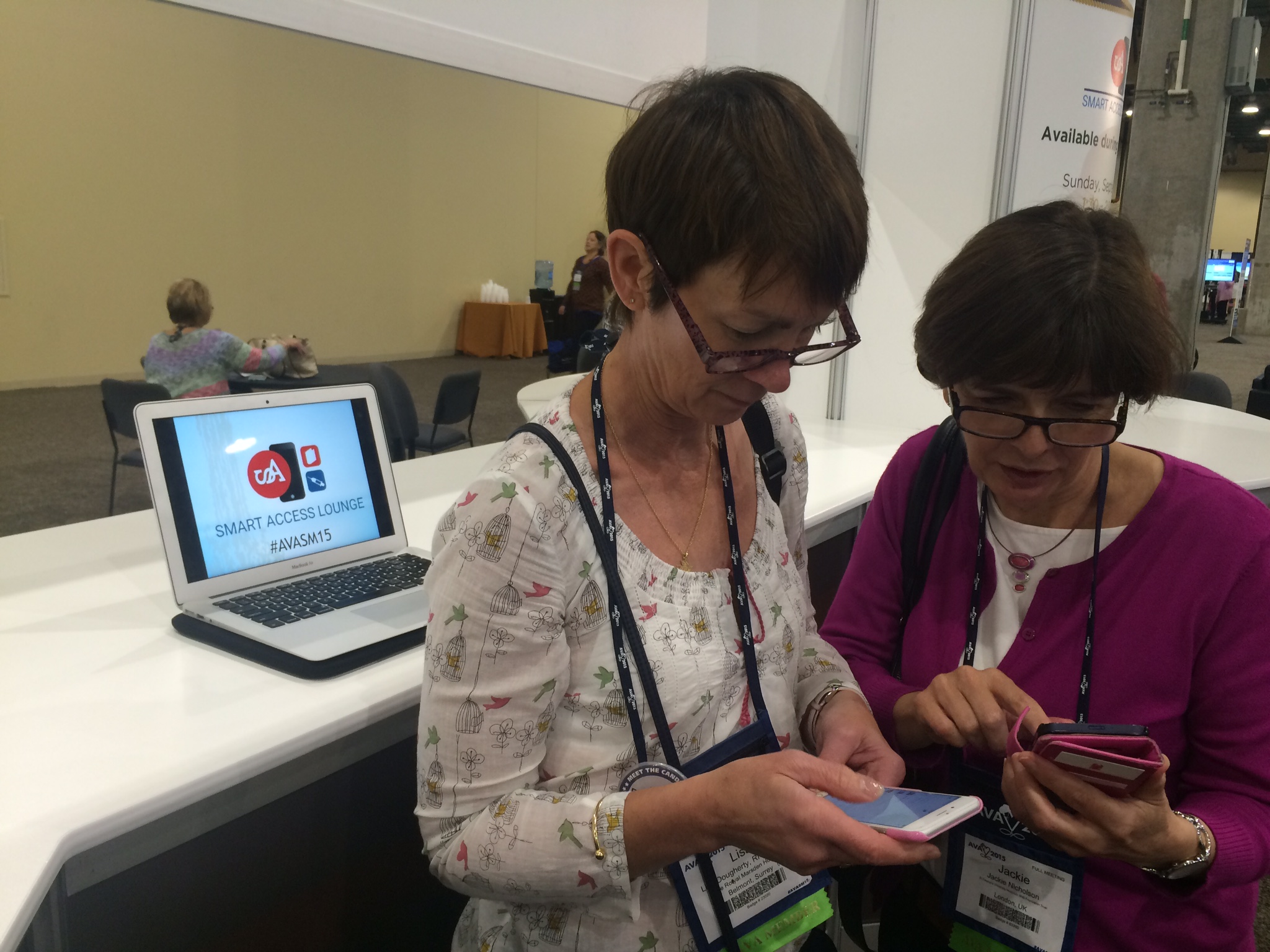
Two of the UK's leaders in vascular access Lisa Dougherty and
Jackie Nicholson receiving some Twitter tuition at the SMART Access Lounge.

Jack Le Donne AVA's Social Media Chair looks at Pete Carr e-poster.
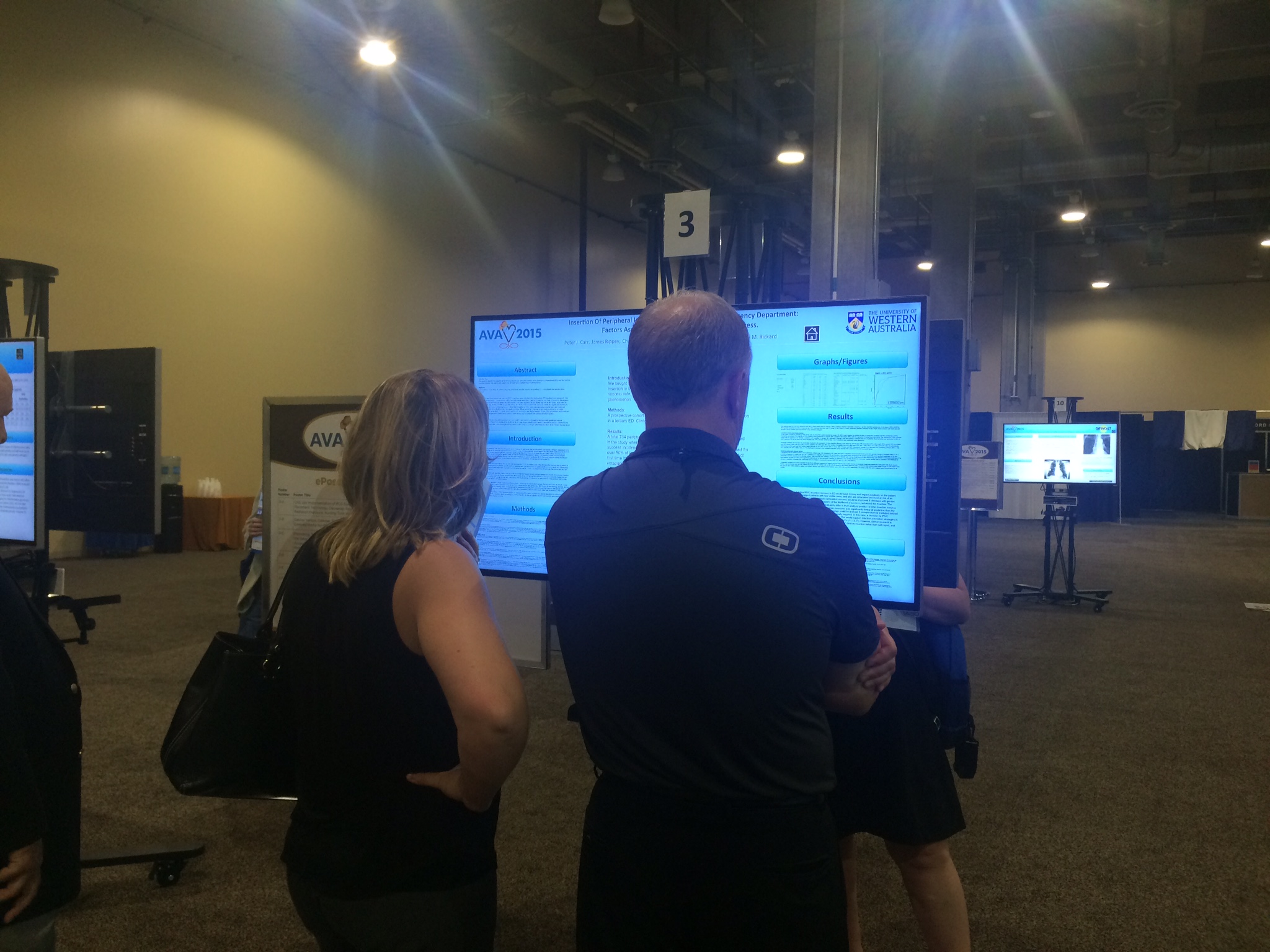
The WA AVATAR submission was popular early in the morning
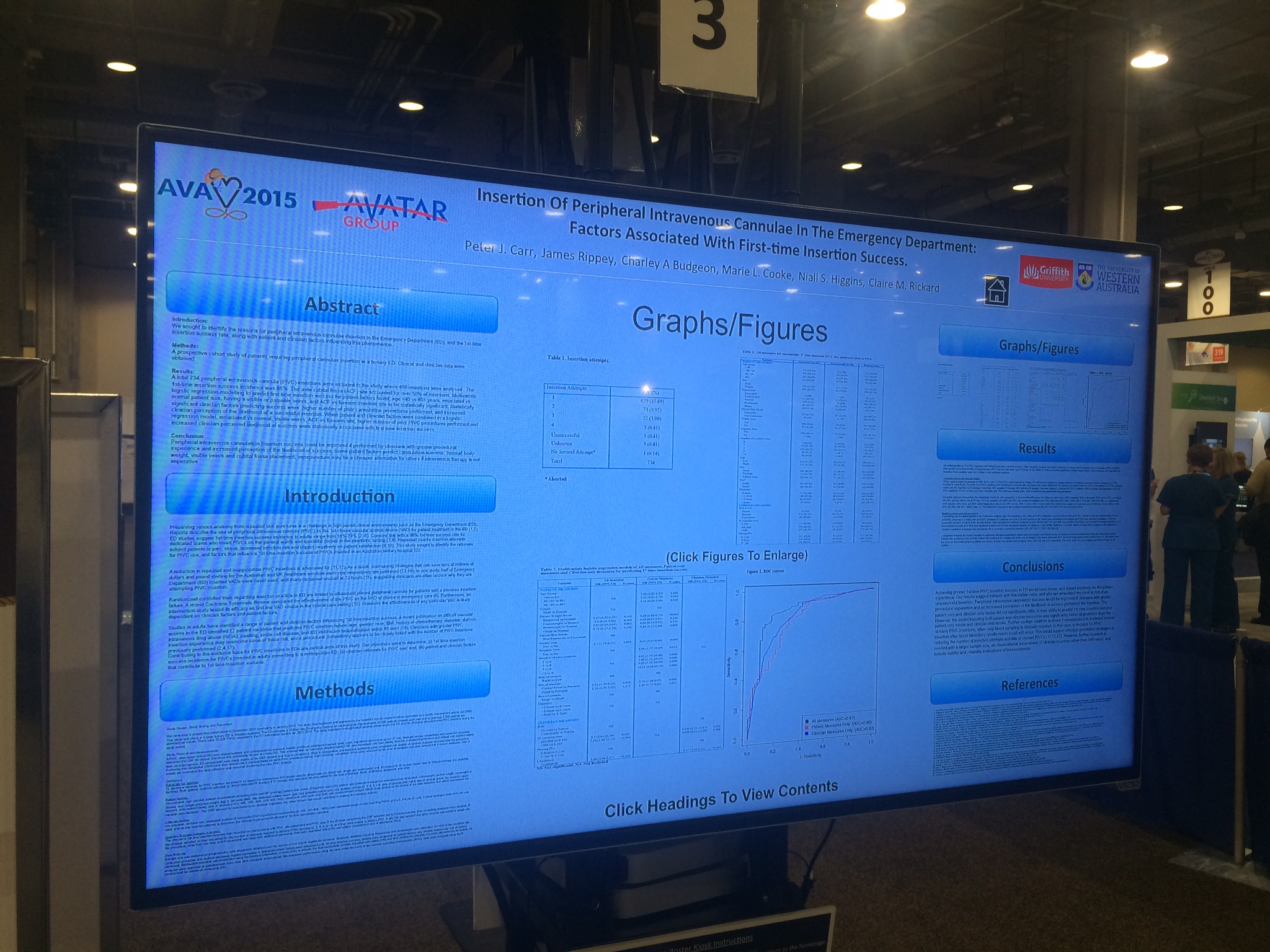
Pete Carr's poster a collaboration of GU and UWA
Events Coming Up Recent Presentations/ Posters
ACN National Nursing Forum, Brisbane, 14-16 October, 2015
Claire Rickard, Gillian Ray-Barruel: Advancing nurse leadership in vascular
access research.
Gillian Ray-Barruel: Developing global nursing research
capacity to improve patient outcomes: Leading the way with a worldwide prevalence study of peripheral
intravenous catheters. Oral presentation and poster.
3M Global I.V. Leadership
Summit, Minneapolis, Minnesota USA, September 23-25, 2015.
Ullman
A. 2015 The Science of PIVs: Optimal Placement and Extended Use
Association for Vascular Access, Annual Scientific Meeting, Dallas, USA, September 26-29,
2015
Wallis M. Moving to clinically indicated PIV replacement: point/counterpoint
Marsh N, Keogh S. Peripheral venous catheter dressing and securement: results
from a 4-group RCT of 1708 patients in 2 hospitals.
Ullman A, Northfield S,
Kleidon T. Sticky solutions: Preliminary results evaluating new technology for CVAD securement.
Keogh S, Marsh N. PIVC flushing and patency: keeping IVs working!
Alexandrou E, Ray-Barruel G. OMG Study. Platinum Showcase.
Reynolds H. Informing Practice of Dressing and Securement of Peripheral Arterial
Catheters: Back to the Future. Oral presentation, and ePoster.
Carr PJ, Rippey
JC.R., Budgeon CA., Cooke ML., Higgins N., Rickard CM. Insertion of peripheral intravenous
cannulae in the Emergency Department: factors associated with first-time insertion success. Poster
Presentation.
Carr PJ and AVA Social Media Committee: The Social Media
& Applications for Research & Teaching (SMART) Access lounge.
Queen Elizabeth
II Jubilee Hospital, Brisbane, September 2015
Gillian Ray-Barruel:
Invited Speaker. The humble IV catheter: Time for a rethink!
3rd International
Conference on Prevention & Infection Control, Geneva, Switzerland, 16-19 June.
Elie
Kasindi Kabululu, Evan Alexandrou, Gillian Ray-Barruel, Claire Rickard: One Million
Global Catheters Worldwide Prevalence Study: Building alliances to put vascular access device management
and infection prevention on the world stage from Australia to the Democratic Republic of Congo. Poster
presentation.
Recent Publications
Rippey JR, Blanco P, Carr PJ (2015). An affordable and
easily constructed model for training in ultrasound-guided vascular access. Journal of Vascular
Access. DOI:10.5301/jva.5000384
#FOAMva (Open Access)
Meng, C., & Lin,
F. (2015). Dressings and securement for central venous catheters (CVC). Journal of Chinese
Nursing Management. . Retrieved from
this
page
Zhang L, Marsh N, Long D, Wei M, Morrison M, Rickard CM.Microbial
diversity on intravascular catheters from paediatric patients. Eur J Clin Microbiol Infect Dis.
2015 Oct 29.
Rickard CM, Marsh N, Webster J, Playford EG, McGrail MR, Larsen E, Keogh
S, McMillan D, Whitty JA, Choudhury MA, Dunster KR, Reynolds H, Marshall A, Crilly J, Young J, Thom O,
Gowardman J, Corley A, Fraser JF. Securing All intraVenous devices Effectively in hospitalized
patients - The SAVE Trial: study protocol for a randomised controlled trial. BMJ Open. September,
2015;5:e008689 doi:10.1136/bmjopen-2015-008689
Ullman AJ, Marsh N, Mihala G, Cooke
M, Rickard CM. Complications of Central Venous Access Devices: a systematic review. Pediatrics
Oct 12. pii: peds.2015-1507.
Rippey JC, Blanco P, Carr PJ. An affordable
and easily constructed model for training in ultrasound-guided vascular access. Journal of Vascular
Access. 2015 Sep 29;16(5):422-7. doi: 10.5301/jva.5000384.
Webster J, Osborne S, Rickard
CM, New K. Clinically-indicated replacement versus routine replacement of peripheral venous
catheters. Cochrane Database Syst Rev. 2015 Aug 14;8:CD007798. Review.
Ullman AJ, Mitchell M, Lin F, New K, Long DA, Cooke ML, Rickard CM Dressings
and securement devices for central venous catheters (CVC) . Cochrane Database Syst
Rev: 2015 Issue 9: Cd010367. IF = 5.939
Broadhurst D, Moureau N, Ullman AJ Central
venous access device site care practices: an international survey of 34 countries. 2015 Journal
of Vascular Access epub
Alexandrou E, Ray-Barruel G, Carr P, Frost S, Inwood S,
Higgins N, Lin F, Mermel L, Rickard CM. A global prevalence study on the use of peripheral
intravenous catheters: results of a pilot study in 13 countries. Journal of Hospital Medicine.
Aug;10(8):530-3. doi: 10.1002/jhm.2389.
Keogh S, Flynn J, Marsh N, Higgins N, Davies
K, Rickard CM. Nursing and midwifery practice for maintenance of vascular access device patency.
A cross-sectional survey. Int J Nurs Stud. 2015 Nov;52(11):1678-85. doi: 10.1016/j.ijnurstu.2015.07.001.
Epub 2015 Jul 11.
Walker G, Chan R, Alexandrou E, Webster J, Rickard CM. Effectiveness
of electrocardiographic guidance in CVAD tip placement. British Journal of Nursing. 2015 Jul
22;24 Suppl 14:S4-S12. doi: 10.12968/bjon.2015.24.Sup14.S4.
Marsh N, Mihala G, Ray-Barruel
G, Webster J, Wallis MC, Rickard CM. Inter-rater agreement of peripheral intravenous catheter-related
phlebitis signs, symptoms and scales. Journal of Evaluation in Clinical Practice. 2015. Jul 17.
doi: 10.1111/jep.12396.
Ullman A, Keogh S, Long D, Coyer F, New K, Rickard CM. 'True
Blood' The Critical Care Story: An audit of blood sampling practice across adult, paediatric and neonatal
intensive care settings. ACC. 2015 June. pii: S1036-7314(15)00075-2. doi: 10.1016/j.aucc.2015.06.002.
Marsh NM, Webster J, Chan R, Mihala G, Rickard CM. Devices and dressings to secure
peripheral venous catheters to prevent complications. (Review). Cochrane Database of Systematic
Reviews. Jun 12;6:CD011070. doi: 10.1002/14651858.CD011070.pub2.
If you would like to
read our articles, go to
http://www.avatargroup.org.au/publications.html or email Rita Nemeth at r.nemeth@griffith.edu.au
Give us a Hi FIVE and Help Fund Intra-Vascular Excellence!
Running costs for the AVATAR group
are now are approaching $1 million per year. The bulk of this money goes to research nurse wages:
worth every cent!
The group has been fortunate to receive Australian government funding
for several studies, with occasional and much appreciated support from industry partners.
In order to continue our research and teaching projects, the AVATAR group has recently launched our fundraising
campaign - the Hi FIVE campaign - Help Fund IntraVascular Excellence in 5 domains: Dressing and Securement;
Flushing and Blood Sampling; Education and Evidence-Based Practice; Infection Prevention; Devices
and Therapy.
We aim to raise $5 million to continue our work for the next 5 years. All donations
are greatly appreciated, big or small, from community members or organizations.
Tax deductions
apply.
Please visit our website, if you are interested in supporting this work: www.avatargroup.org.au
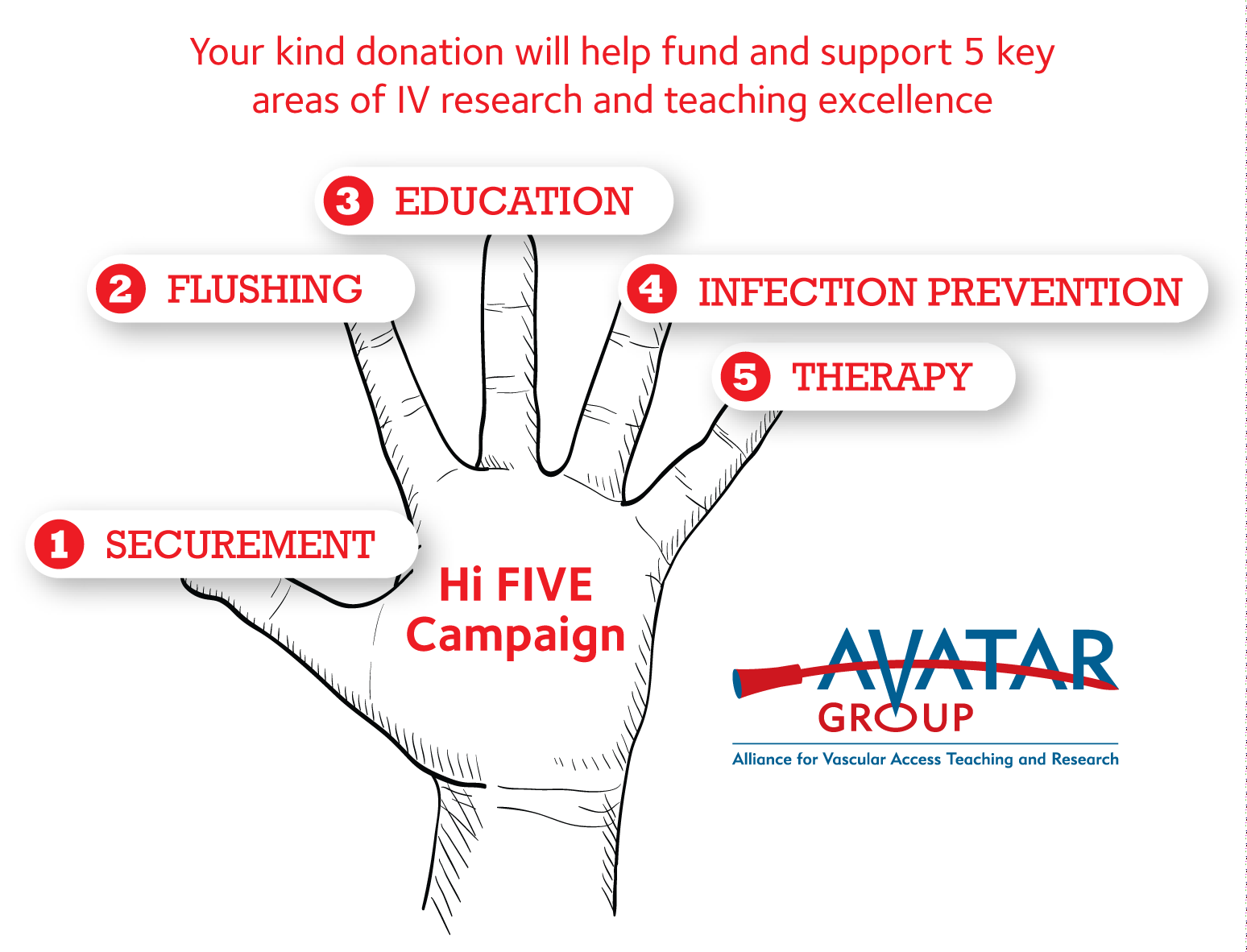
|